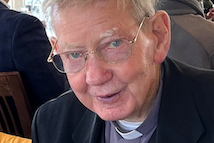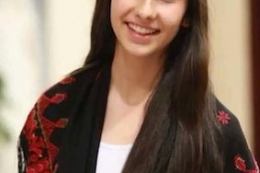Bishop Kenney: Israel's Security Wall 'an insult to human dignity'
Bishop William Kenney CP, Auxiliary in Birmingham, and spokesman on European Affairs for the Bishops' Conference of England and Wales Last month I visited the Holy Land, Palestine and Israel, and at times my fingers can itch to be a politician rather than the priest that I most definitely am. I was a member of the "Co-ordination Group of Episcopal Conferences in Support of the Church in the Holy Land". This Group represents Catholic Episcopal conferences of Europe and North America and was formed in Jerusalem in 1998 at the request of the Holy See. During this journey, we heard again of the problems facing both Israel and Palestine and also talked to some very ordinary people in the Christian parishes of the West Bank and also to students at Bethlehem University. My first task as bishop and priest is, of course, to bear witness to other values than the political and economic. We spoke of peace and prayed to the God of all the peoples of the world, that a just peace might be created. We spoke of family values and education, of friendship and laughed over coffee and wine. I did this, particularly, in the parish of Beit Sahour, where I celebrated Mass and had an opportunity to meet many children who were visiting Bethlehem from many parts of Palestine and Israel. These children had travelled sometimes for many hours and through various check-points in order to be there for the feast of the children for the day when the Church celebrates the Epiphany. The irony of that situation was not lost on many of the adults present. The feast celebrates that God showed himself as a human being to the people who were not Jews. Now it is enormously difficult for the people of his own land to gather to celebrate that fact. The land where first of all what we called the brotherhood of nations was first revealed is now a land where it is difficult for people to even meet each other. Many people in that parish and in other places and so many Israelis seem tired of the constant tension, the lack of security and they desperately long for peace. We also visited Bethlehem University which is in Palestine, where Muslim and Christian students study together very harmoniously. We met a number of these students, both Christian and Muslim. I was impressed by their commitment to their studies, their energy and their enthusiasm. All of them would like to stay in the land of their birth and they want a situation which would enable them to do so, and to live together as one community. They want peace, but for many of them, it is still extremely difficult, if not impossible to travel to Jerusalem, which is only a few miles away. We asked people whether they were hopeful after the recent visit of President George Bush, and the beginning of new contacts between Israel and Palestine. Unfortunately, many people seem to have given up hope. The reality on the ground, as we heard many times, is still that of check-points, of an inability to visit one's family when one wants to, of hindrance to economic transactions, and a general feeling that it is not safe. This was true of both Israelis and Palestines. There are serious questions about security for Israel. The firing of rockets from Gaza is one proof of this. At the same time, the situation for the Palestinian people is indeed under the dignity that every man and woman should be shown. It is now impossible to visit the Holy Land without being aware of the 'security wall', as it is called. Many of us find that 'wall' an insult to human dignity, both to the dignity of the Israelis and to the Palestinians. History would seem to show that the building of walls to keep people either in or out is always a sign of weakness of the builders and comes from fear, and fear is never a good ground for building a state or any society upon. The deep-seated fear of the Israelis for their existence is almost tangible. Looking at the history of the Jews and not least their history in the last century one understands that fear, and what it is based on. Again, however, history teaches us that fear leads almost invariably to war and conflict. This year we will celebrate the 60th anniversary of the founding of the modern State of Israel. It is time for that state to build on its history rather than repeating the mistakes of the past and fearfully looking over its shoulder at all that has happened. Security is built on people trusting one another and living together in peace because they have shared values of family, joy, and the exuberance of just being people together of whatever race or belief. We heard much about the situation in Gaza. Last year I visited the Gaza and I intend to do so again this year. What concerns me is the humanitarian situation. Again, we understand the security problems, but that cannot excuse the situation which is now developing. It was, for instance, reported to us, that there are problems in pursuing the project of a new sewerage system in Gaza because of the difficulty of bringing in the piping through Israel. Yet, if these and other measures are not taken, the world could again be facing a humanitarian catastrophe. We have already seen such catastrophes in Rwanda and, to some extent, in the Balkans, where the world did not interfere. Dare we risk again that could now happen in Gaza because of the lack of infrastructure and proper care of the over one million people who live there? From my many visits to Israel and Palestine it seems to me that the solutions being pursued at the moment in this area are the wrong ones. I firmly believe that most people, when put together with other people, get along rather well. Human beings from most parts of the world share the same concerns; how to bring up their families, how to live in peace, how to have a life which is in conformity with their real dignity as women and men. When people meet there is at times friction because of difficult cultures, there are at times some real difficulties but, basically, people want to get on with their neighbours. At the moment, the policies being pursued in the Holy Land, in Israel and Palestine, mean that people cannot even meet their neighbours. This is wrong. The security wall is splitting people from their families, stops people in emergencies going to hospital, creates difficulties for economic life, stops students getting to their places of study, or at the very least, making all these things very difficult.


















